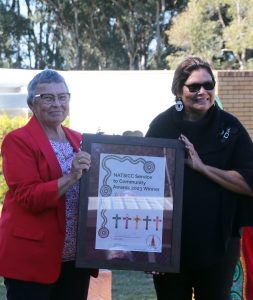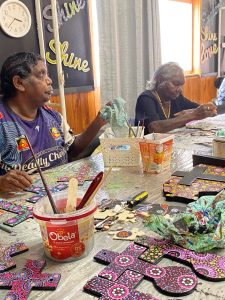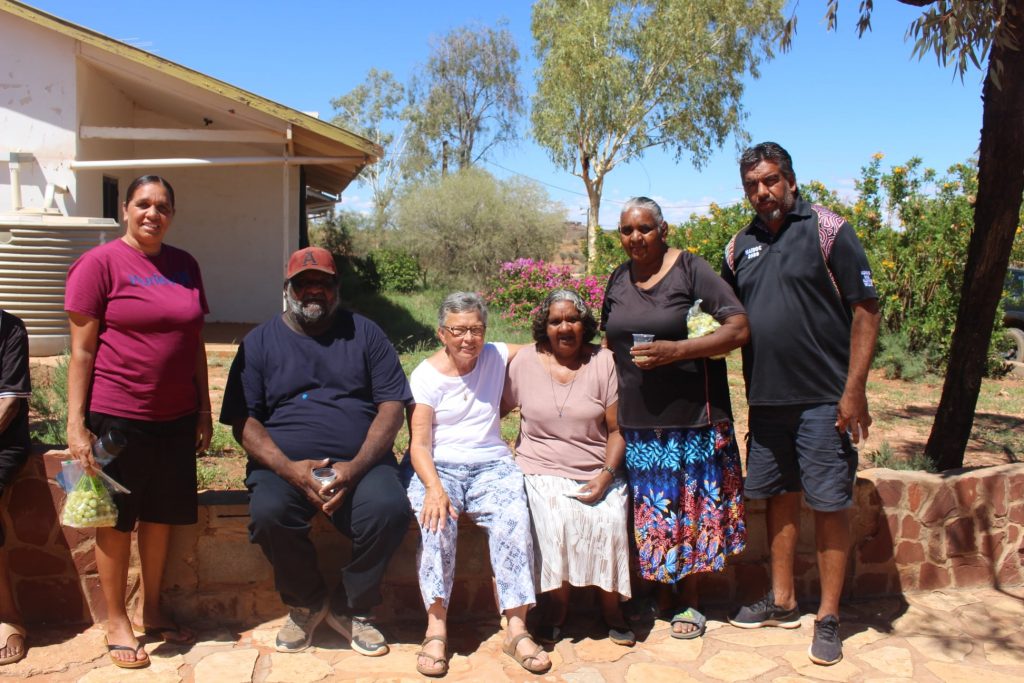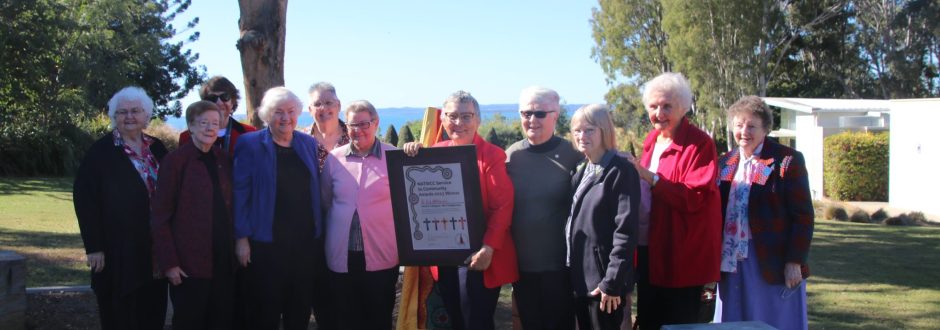Good Samaritan Sister Liz Wiemers’ lifelong dedication to Aboriginal and Torres Strait Islander ministry and her commitment to foster understanding and respect have been recognised with a National Aboriginal and Torres Strait Islander Service to Community Award.
By Debra Vermeer
Liz said the award was “certainly a surprise”, but the fact that the award came from Aboriginal people themselves was very meaningful for her. “That does mean a lot to me,” she said.
The citation for the award said that through her more than 40 years in ministry, Liz had immersed herself in the Eastern Arrernte culture and language, building deep connections and mutual understanding.
“Her willingness to live alongside the Aboriginal people and her respect for their traditions reflect her genuine desire for reconciliation,” it said. “Sister Liz’s work as a parish assistant, facilitator of immersion groups, and coordinator of the spirituality centre and parish accommodation demonstrate her unwavering compassion and commitment to bridging cultural divides.”

NATSICC representative Thelma Parker presents the award to Sister Liz Wiemers SGS. Photo: Sr Veronica McCluskie SGS.
Speaking after the presentation of the award, Liz said her affinity for Indigenous Australians went right back to her childhood in Atherton in Far North Queensland.
“I grew up with Aboriginal people and wherever I’ve been since, especially teaching in schools, I was around Aboriginal students and I gave them particular attention and tried to bring their culture to the school,” she said.
Liz recalled as a young person seeing instances where Aboriginal people from the mission near her town were subject to unfair treatment. “They were treated as less; they weren’t given the same choices as other people,” she said.
“It instilled in me at a young age the strong belief that Aboriginal and Torres Strait Islander people are people, and we can learn from them and the gifts they have. By our values they are poor, but their values place importance on family and culture before things.”
Liz worked as a jillaroo and a teacher before joining the Good Sams in 1987. She continued teaching for some years with one of her teaching postings being to St Teresa’s College, Abergowrie, a secondary boys’ boarding school where 97 per cent of the students are Aboriginal and Torres Strait Islanders.
“It’s a wonderful school and one of the principles we worked on there was that we had to look after the parents if we were going to look after the students, then enrolments would look after themselves, so we put a great emphasis on caring for the families of students,” Liz said.
“As part of that, I think I’ve been to every island in the Torres Strait and communities in Cape York and even into the Northern Territory for a pastoral visit with families. We built up those relationships and it became an important part of the school ethos, which continues to this day.”
While at Abergowrie, Liz started a half-hour weekly radio program through Cape York and the Torres Strait, interviewing young men from the college who were doing well in various areas and sharing their stories with their communities.
“We also did a lot of shaping of the liturgy around Aboriginal and Torres Strait Islander culture, and it’s great to see that still continuing.”
In 2009, Liz took up a ministry opportunity in Santa Teresa, or Ltyentye Apurte, a small Aboriginal community located about 90km from Alice Springs.
When Liz first arrived in Santa Teresa, the Howard Government’s ‘Intervention’ was still in its early stages. This was a set of policies enacted in response to the ‘Little Children are Sacred’ report, which found that child safety issues in Indigenous communities had reached crisis levels.
The Intervention applied to 73 Indigenous communities in the Northern Territory and its powers included withholding 50 per cent of welfare payments, increased police presence in communities, and the power for government to take possession of Aboriginal land and property.
“It was a hard time for the people,” Liz said.
She said one of the joys she had was being able to do some advocacy from time to time. “I define advocacy as saying what the people want said and not what I want to say,” she said.
Liz said her advocacy ranged from overarching policy matters to smaller but still significant problems, such as officials not responding to reports of a broken hot water system.
Another joy for Liz was working with the many school immersion groups that visit Santa Teresa, raising awareness of issues relating to Aboriginal people in Australia.

Artists at the Santa Teresa Spirituality Centre in the NT. Image supplied.
Liz said two main principles drove her work in Santa Teresa. The first was to foster independence as opposed to a dependency model. The second principle was the responsibility to be a good steward of people, property and finances.
One way she helped to foster independence and good stewardship was the development of the Santa Teresa Spirituality Centre, a place where the town’s women gather to spend time together while painting beautiful crosses and silk scarves.
“It’s done wonders for the women, to give them that independence and sense of pride and purpose,” Liz said. “What has made the difference in the case of the Spirituality Centre is that the decisions are made by the women, it is their project. That is why it has been sustainable. So often others decide what is good for people. These women are the ones who decide for themselves.”
Their crosses are in high demand and are found not only throughout Australia, but right around the world.
Liz’s time in Santa Teresa was marked by continual learning of the Arrernte culture and language.
“I’ve been blessed to have been taught aspects of deeper culture, which they don’t share with everyone. I regard all of that as very precious. It’s changed me. I can never go back to how I was before,” she said.
In accepting her NATSICC award, Liz said the huge challenge facing Australia at the moment was, can we live with difference?
“Can we accept that my values are not necessarily other people’s values nor, perhaps, the best values?”
Liz, who now volunteers at the Santa Teresa Spirituality Centre in Ormiston on Queensland’s Moreton Bay, which has “a lovely connection with the local Quandamooka people”, said this question was crucial to the upcoming referendum on the Voice to Parliament.
“The Voice could be a huge success in terms of the referendum, but if we don’t begin to live with people who are different from ourselves then we’ve missed the deeper and real challenge or invitation,” she said.
“The real question is, can we let Aboriginal people be Aboriginal people? Do I want everyone, no matter who they are, to be like me?
“I get very disappointed by how politicised the discussion has become, and yet we’re missing the real issues underneath. I’d love people to begin to talk about it at a deeper level.
“The Voice is not about political success; it is about people and their lives. Instead of telling others what is good for them (again), the time has come to listen, and to listen in an unbiased way to all the voices, the soft and the loud, the near and far away. There are ways we can do this.
“That’s the discussion we should be having.”

Sister Liz Wiemers’ ministry in Santa Teresa was one of deep collaboration with the local Arrernte people. Image supplied.
